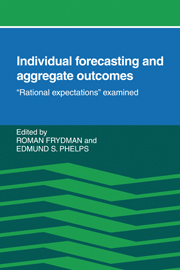Book contents
- Frontmatter
- Contents
- List of contributors
- Preface
- 1 Introduction
- 2 The trouble with “rational expectations” and the problem of inflation stabilization
- 3 Expectations of others' expectations and the transitional nonneutrality of fully believed systematic monetary policy
- 4 The stability of rational expectations in macroeconomic models
- 5 Individual rationality, decentralization, and the rational expectations hypothesis
- 6 Convergence to rational expectations equilibrium
- 7 A distinction between the unconditional expectational equilibrium and the rational expectations equilibrium
- 8 On mistaken beliefs and resultant equilibria
- 9 Equilibrium theory with learning and disparate expectations: some issues and methods
- 10 Keynesianism, monetarism, and rational expectations: some reflections and conjectures
- Index
7 - A distinction between the unconditional expectational equilibrium and the rational expectations equilibrium
Published online by Cambridge University Press: 05 June 2012
- Frontmatter
- Contents
- List of contributors
- Preface
- 1 Introduction
- 2 The trouble with “rational expectations” and the problem of inflation stabilization
- 3 Expectations of others' expectations and the transitional nonneutrality of fully believed systematic monetary policy
- 4 The stability of rational expectations in macroeconomic models
- 5 Individual rationality, decentralization, and the rational expectations hypothesis
- 6 Convergence to rational expectations equilibrium
- 7 A distinction between the unconditional expectational equilibrium and the rational expectations equilibrium
- 8 On mistaken beliefs and resultant equilibria
- 9 Equilibrium theory with learning and disparate expectations: some issues and methods
- 10 Keynesianism, monetarism, and rational expectations: some reflections and conjectures
- Index
Summary
A number of investigators have recently argued that learning and convergence to rational expectations equilibrium are problematic. These results suggest that despite the great popularity of minimum mean square error forecasts and the associated notion of the rational expectations equilibrium, the problems of modeling expectations and a definition of an appropriate notion of equilibrium in stochastic models are still important areas of investigation.
Typical linear stochastic macroeconomic or market models contain expectational variables, forecasts, which are the averages of individual expectations. This formulation suggests a possibility of defining a notion of stochastic equilibrium in terms of the behavior of averages of forecasts.
In this chapter we shall define a simple notion of “aggregate” equilibrium. It is called the unconditional expectational equilibrium, and it is defined by the requirement that in the context of a specific model, forecasts of the endogenous variable be equal to the expected value of the probability distribution of this variable.
It should be emphasized that the unconditional expectational equilibrium concept pertains to the behavior of averages of individual expectations. Therefore, there is no presumption that it is based on the optimality of individual behavior.
The unconditional expectational equilibrium coincides with the rational expectations equilibrium in models containing exogenous variables that are independently and identically distributed (i.i.d.).
- Type
- Chapter
- Information
- Individual Forecasting and Aggregate Outcomes'Rational Expectations' Examined, pp. 139 - 146Publisher: Cambridge University PressPrint publication year: 1984
- 3
- Cited by

